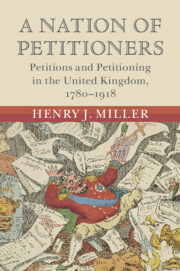Book contents
- A Nation of Petitioners
- Modern British Histories
- A Nation of Petitioners
- Copyright page
- Dedication
- Contents
- Figures
- Tables
- Acknowledgements
- Abbreviations
- Introduction
- Part I Petitions
- 1 Petitions to the House of Commons I
- 2 Petitions to the House of Commons II
- 3 Subscriptional Cultures and Petitionary Documents
- Part II Petitioners
- Part III Petitioning
- Select Bibliography
- Index
3 - Subscriptional Cultures and Petitionary Documents
from Part I - Petitions
Published online by Cambridge University Press: 02 February 2023
- A Nation of Petitioners
- Modern British Histories
- A Nation of Petitioners
- Copyright page
- Dedication
- Contents
- Figures
- Tables
- Acknowledgements
- Abbreviations
- Introduction
- Part I Petitions
- 1 Petitions to the House of Commons I
- 2 Petitions to the House of Commons II
- 3 Subscriptional Cultures and Petitionary Documents
- Part II Petitioners
- Part III Petitioning
- Select Bibliography
- Index
Summary
Public petitions to the Commons were part of a broader subscriptional culture. This chapter examines the nature and extent of petitions to other authorities to reassess the evolution of the UK state during the nineteenth century. During this period, petitions were transformed from being generic requests to power to their more modern meaning as expressive and participatory practices linked to representative institutions. Accordingly, other types of petitions to Parliament concerning contested elections and private bills were hived off into specialised processes. Petitions to the House of Lords, though smaller in scale than the Commons, reinforced the upper house’s authority during an era of democratisation and allowed peers to claim popular backing for their veto power. Addresses to the monarchy were a major form of interaction between monarch and subjects, and called upon the monarch to exercise their political supremacy over the other branches of state. Memorials to government provided a discrete mechanism for interest groups to lobby ministers and officials, and were increasingly adopted by pressure groups. The relationship between the state and the people was recast through petitionary interactions that underpinned and renewed the legitimacy of different branches of the state even in the absence of electoral or institutional reforms.
Keywords
- Type
- Chapter
- Information
- A Nation of PetitionersPetitions and Petitioning in the United Kingdom, 1780–1918, pp. 72 - 102Publisher: Cambridge University PressPrint publication year: 2023

